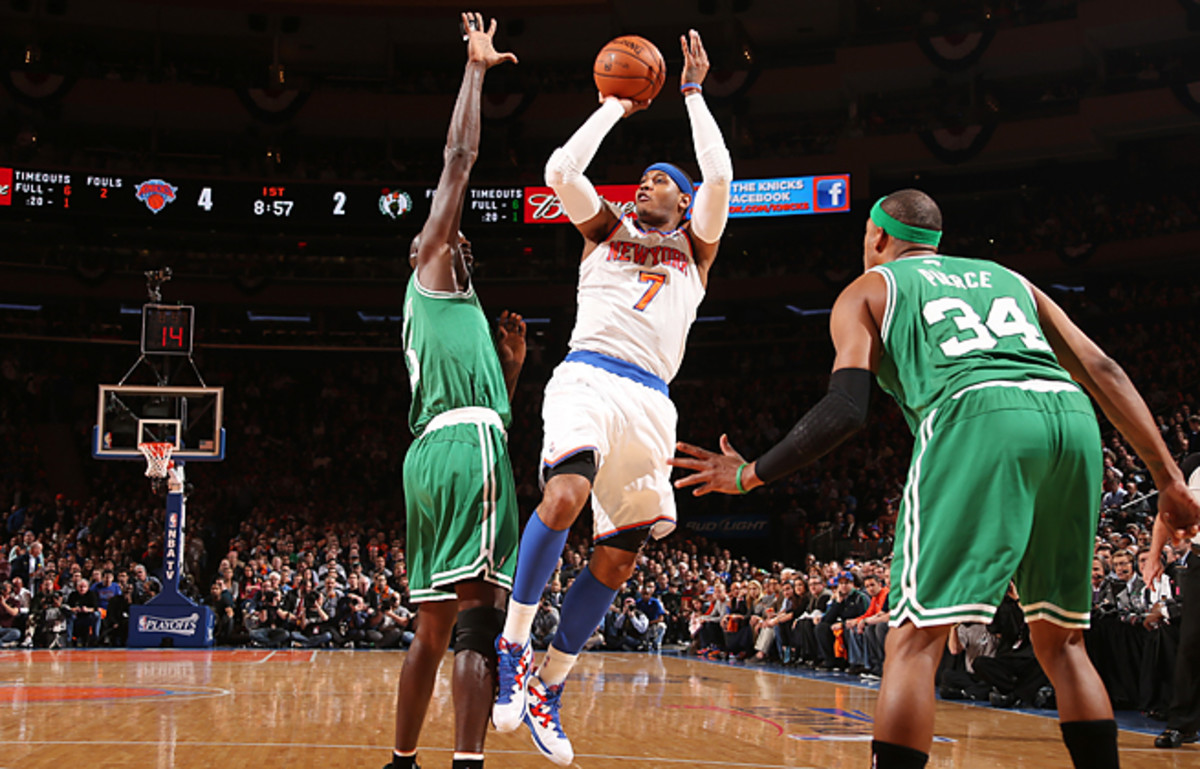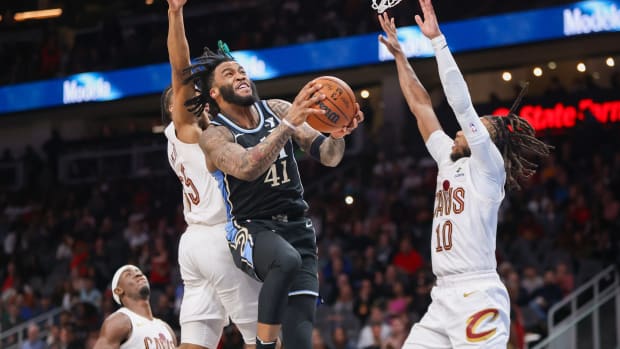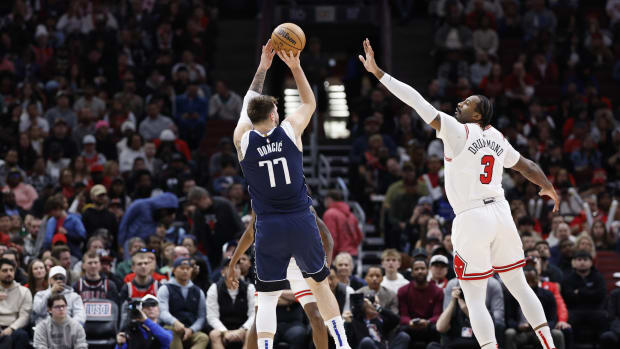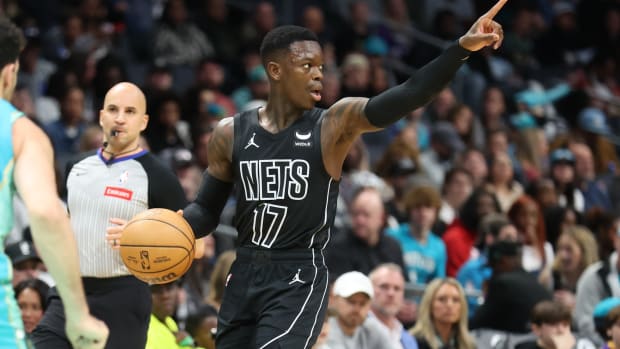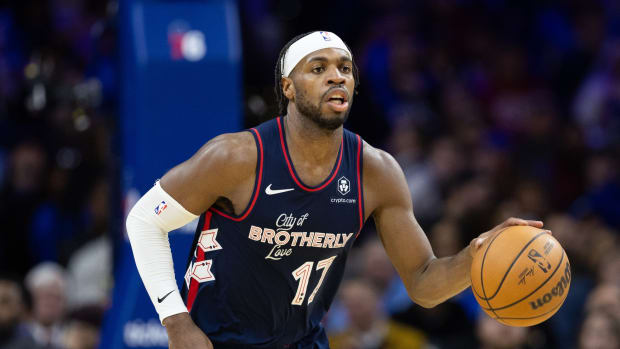Celtics' weaknesses leave them helpless against surging Knicks
NEW YORK -- Another day, another year, Carmelo Anthony's late third quarter drive might have ended with another result. Three years ago, Anthony may not have been able to breeze by Paul Pierce, may not have been able to beat a closing Kevin Garnett to the rim. Three years ago 'Melo might have been met by the burly paws of Kendrick Perkins or Rasheed Wallace, Boston's interior enforcers that backstopped the 2010 Celtics to the NBA Finals. This is a different Celtics team, though, one ravaged by injury and salary cap constraints, one that can't overcome a gap in talent with sheer determination and will. And so Anthony punctuated the possession with a one-handed slam, capping a 32-11 third quarter run, extending the Knicks lead to 74-59 and effectively putting an eventual 87-71 Game 2 win out of reach.
It's tough to watch these Celtics, really. The pride is there, the burning desire to win, but not the talent. Hours before the game, Doc Rivers, staring into a bank of cameras, declared that the Celtics would go to Pierce early and often, regardless of the matchup. Pierce hoisted a team-high 19 shots on Tuesday night, making eight while attacking the basket, futilely trying to put the team on his shoulders. But with this group, Pierce has little help. With Garnett limited to 24 minutes with foul trouble, the victim of ticky-tack calls that Rivers deemed "horrendous," the Celtics had nowhere to turn. Think about who Boston is using: Jordan Crawford, who couldn't get any meaningful run in Washington -- Washington -- this season played 25 minutes. Brandon Bass played 24, Chris Wilcox chipped in six. Beyond rookie Fab Melo, there is no legitimate center. The Celtics roster is a salvage yard, filled with players lottery teams would leave on the heap.
The absence of Rajon Rondo is killing Boston, a fact hardly lost on the Knicks. The 23 points the Celtics scored in the second half was the fewest in the team's playoff history, and you can draw a straight line from the lack of production to the ACL injury-induced disappearance of their All-Star playmaker. J.R. Smith called the Celtics "a little fuzzy up top on who they want to get it to and why" without Rondo. "When Rondo is out there, they are in a certain flow," Smith added. "When he is not out there, they sort of don't know who to go to or [what] plays to run. That's a credit to a great player like Rondo. When he is in the game, he seems to know two or three plays ahead of what they want to do."
The Celtics' misfortune isn't New York's concern, except when it can take advantage of it. To a man, Knicks players professed over the last two days to a ratcheted up sense of urgency to win on Tuesday. They didn't want to go back to Boston even, didn't want to face that crowd, that unbridled emotion, that team with a loss in hand. They didn't want to let Pierce get rolling, knowing that if he did they simply couldn't defend him. New York has battled its fair share of injuries -- more in some ways, really -- but going into the playoffs, expectations were enormous. It's conference finals or bust, a deep playoff run or heads are likely to roll. And for a team so dependent on making jump shots -- the Knicks attempted a league-high 2,371 three-point attempts during the regular season -- a loss would see the rim reduced to the size of a thimble, would suddenly tack 1,000 pounds of added pressure to their shoulders.
It won't, and suddenly the questions pivot to just how good the Knicks are. Carmelo Anthony has scored 70 points in the first two games of this series, some efficiently (an eight-for-13 second half in Game 2), some not (three-for-11 in the first half). But 'Melo has been boosted by the play of Smith, the newly minted NBA Sixth Man winner, who chipped in 34 points in the first two games, including 19 on Tuesday night. And in Game 2 Anthony also got a lift from Raymond Felton, who, said Mike Woodson, "changed the game in the third quarter" and finished with a tidy 16-point, seven-rebound night.
"[Felton] was the X-factor," Garnett said.
Through two games, the Knicks have been steady, limiting Boston to 39.2 percent shooting on their home court. With Boston leading 48-42 at the half in Game 2, the Knicks locked up the Celtics, holding them to seven field goals in the second half, recalling memories of New York's early-season success, when the team won its first five games behind a stingy D that held opponents to less than 40 points in the second half. Those days the Knicks were a team determined to rank among the defensive elite. That enthusiasm faded, and New York finished the season with pedestrian numbers in many significant categories. In the postseason, though, the fire has returned, and so have the shrinking statistics.
"We know when we really buckle down on the defensive end, it's hard for teams," Anthony said. "Now, in the playoffs, it is magnified times ten. Each play, each possession means that much more. We have been locking down."
The Knicks have pushed the Celtics to the brink, and they head to Boston in a prime position to finish them off. Issues of shot selection, of defensive consistency will undoubtedly resurface in future series against Indiana or Miami, but this one is finished. Boston can't win four out of the next five, not without Rondo, not with that roster. There is only so much a superior coach like Rivers can do, only so much faded greats like Pierce and Garnett can squeeze out of their bodies.
As he finished addressing reporters late Tuesday night, Rivers summoned a smile to acknowledge the hole his team was in. "I guess they say the series hasn't started, and I have heard this corny line a million times, until the road teams wins," Rivers said. "Well I am positive the series has started because we are down 2-0."






























